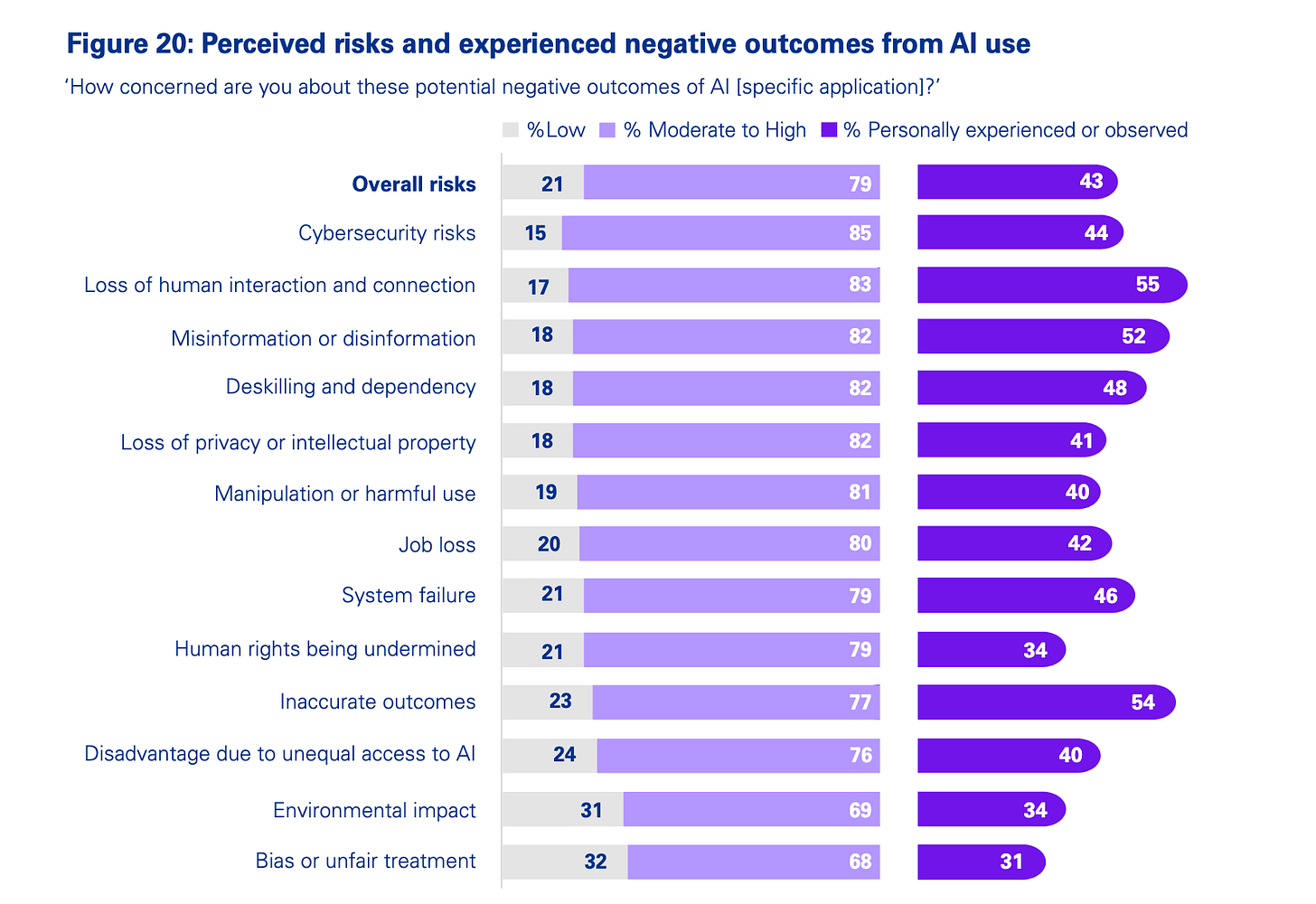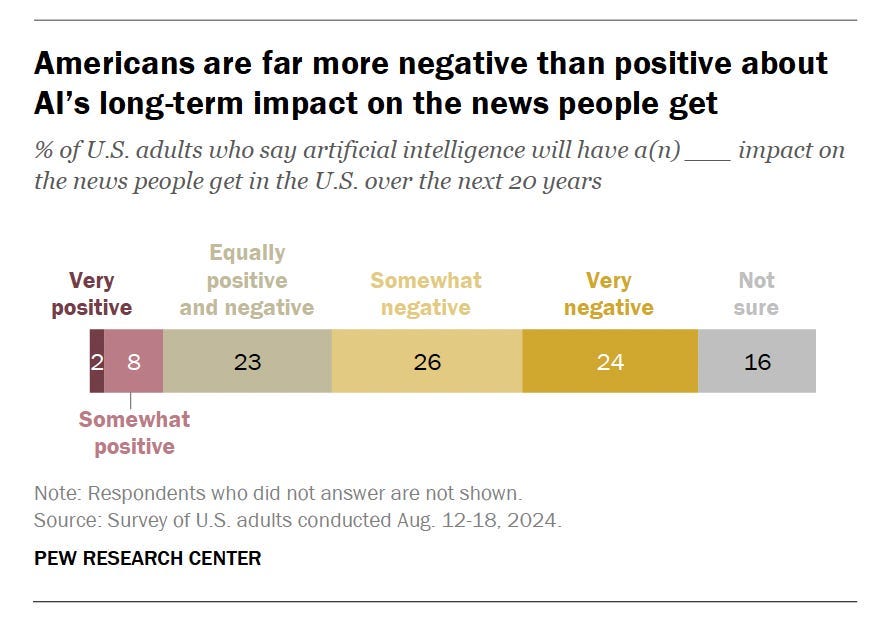A Major Newspaper Publishes a Summer Reading List—but the Books Don't Exist
The AI disaster is getting worse—and a new survey of 48,000 people in 47 countries makes clear that the public is fed up
Critics aren’t perfect.
Sometimes they get facts wrong. Sometimes their judgment is faulty. Sometimes they dangle their modifiers or split their infinitives with everybody watching.
I’ve been there. And it’s awkward.
Please support my work by taking out a premium subscription—just $6 per month (even less if you sign up for a year).
But I’ve never seen anything as embarrassing as the “Summer Reading List for 2025” in the Chicago Sun-Times.
It gave glowing reviews to books that don’t exist. And I bet you can guess why.
Yes, the newspaper relied on AI to write the article.
The article starts with a recommendation for Tidewater Dreams by Isabel Allende. This is Allende’s ”first climate fiction novel” where “magical realism meets environmental activism.”
It’s a shame that Allende never wrote this book. Nor did anyone else—the book simply doesn’t exist.
(I’ll predict, however, that an AI-generated book with this title will show up on Amazon within a few days. When you live in a world of AI hallucinations, this is how the business model plays out.)
The next book on the Sun-Times list is The Last Algorithm by Andy Weir. This novel is also non-existent. But the storyline—about rogue AI that gains consciousness—makes me think that the bots are now mocking us.
It doesn’t get better. The first 10 books on the summer reading list are entirely hallucinated.
As the story of the fake reviews spread on social media, the Sun-Times got into damage control mode. It issued a public statement denying responsibility.
But that just makes matters worse.
Why are they publishing garbage without vetting it? And the denial is also implausible.
Somebody at the newspaper must have given the okay to this. The printing presses don’t run themselves (although maybe that will be the next stage of the AI business model).
How is this happening?
We are now several years into the AI revolution. I’m constantly hearing about new, improved bots that are smarter than super-geniuses, and can replace lowly humans.
But the bizarre lapses are getting worse—and more dangerous.
AI is routinely making stupid, nonsensical mistakes that even the most incompetent employee would never make. I’ve met some incompetent journalists over the years, but none would make a boneheaded move of this magnitude.
And this is after a trillion dollars has been sunk into AI by the most powerful corporations in the world. This is after they have soaked up much of the energy grid. This is after all the training and vetting and upgrading.
We’re not talking about beta testing or first generation AI. Silicon Valley is actually bragging about this tech—but it’s stupider than the worst journalist in the country.
When do we push back?
It’s clear now that the people who own this technology can’t be trusted. They have force-fed it upon an unwilling society—they make us use it even if we hate it. Along the way, they have broken the law repeatedly and brazenly.
We now need external restraints.
Maybe that comes from legislation. Maybe it comes from litigation. Maybe it comes from public shaming. But it has to come from somewhere outside of the Silicon Valley echo chamber—because the insiders are shameless and destructive.
This isn’t just my opinion. It’s the consensus view everywhere in the world.
A recent survey asked 48,000 people in 47 countries what they think about AI. Can you guess what they said?
People are usually excited about new technologies. Let’s fly to the moon! Let’s cure a disease! Let’s surf the worldwide web.
But AI stirs up a different reaction. People dislike it. People fear it. People want to 86 it.
And the more experience they have with AI, the more hostile they get. The KPMG study makes that absolutely clear.
At the start of the AI revolution, around half of the public were worried about it. But the hostility has increased every year. Soon two-thirds of the people will distrust AI.
But the next chart is the most alarming of them all. When asked about 14 different types of risk linked to AI, the respondents ranked EVERY RISK as moderate or high.
And this happened by more than a two-thirds majority in every instance.
This is a peculiar situation, no?
We’re talking about the biggest investment in the history of technology. And the public hates it.
The more you dig into demographics, the uglier the picture gets. For example, the people who earn the least feel the most at risk.
Do you blame them?
Other surveys ask the public about the impact of AI on specific businesses. And the responses here are even more negative.
In fact, the numbers here are mind-blowingly negative. Only 2% of the public believes that AI will have a very positive impact on the news.
Two percent? I’ve never seen a favorability rating that low in my entire lifetime. Hannibal Lecter and Darth Vader poll better than that.
And this survey took place before the Sun-Times debacle.
Not only does AI ruin the quality of news—it also hurts the journalists themselves. The bots might be unreliable or hallucinating but they will still take away jobs from human writers.
And the public—who rely on journalism for vital information in a functioning democracy—is fully aware of this risk.
Now let me get personal…
Musicians might be even more at risk than journalists. It’s gotten so bad that the superstars are worried.
On May 10, more than 400 British musicians, writers, and artists published an open letter to the Prime Minister—begging him for protection from AI.
The list of signees crosses all generation and genres—and includes Paul McCartney, Elton John, Dua Lipa, Sting, Coldplay, Kate Bush, Andrew Lloyd Webber, Simon Rattle, Eric Clapton, Annie Lennox, Shirley Bassey, Tom Jones, Florence Welch, and many other familiar names.
Discounted group subscriptions to The Honest Broker are now available.
But the non-musicians on the list are just as impressive—Nobel laureate Kazuo Ishiguro, playwright Tom Stoppard, actor Hugh Grant, and dozens of institutions from the Royal Shakespeare Company to the English National Ballet.
I’m confident that a US petition of this sort would get the same degree of support from American musicians and organizations.
And what do these artists want?
“AI is wonderful, except for the fact that it’s destroying media, education, the environment, music, the arts, people’s thinking skills, and everybody’s job.”
If AI really were—as is so often claimed—a great creative tool, you might anticipate that these visionary artists would be demanding accelerated development of the tech. After all, these same musicians have readily embraced new tech in the past.
But that’s not how they feel about AI.
For a start, they are begging for transparency. Just let us know who is using our music (or writing or whatever) to train AI.
How could anyone deny such a reasonable request? Is there anyone who benefits from secrecy in this matter?
Let me point out the obvious. Only a criminal trying to steal people’s life work would want to keep all this hidden.
Alas, we now have overwhelming evidence that this kind of criminal behavior is widespread in the AI business. For example, we now know that Mark Zuckerberg gave his team permission to violate copyrights by training the company’s AI on seven million pirated books.
This included almost everything I’ve ever published in book form. Yes, this is personal for me.
You might expect political leaders would step in at this point, and defend the millions of creative professionals at risk from this piracy. But instead, they are doing the exact opposite—even firing the director of the US Copyright Office, allegedly because she was worried about violations of IP law in AI training.
If you look at everything I’ve written above, you can only reach one conclusion.
You can see that a tiny number of powerful people want to use AI to enrich themselves. But the public has figured this out—and is fearful of the consequences.
AI is getting imposed on a resistant society, without people’s permission and often in clear violation of their rights.
They now see that the business models built on AI are (as I’ve repeatedly warned) mostly scamming, shamming, and spamming.
I offered a few examples in a recent paywalled article. But I could list a hundred like these.
Let me share some brand new updates from the land of the bots:
A new AI app just dropped with an amazing promise. It tells users that they can “cheat on anything.”
25% of community college applicants in California may be AI bots. They get accepted, and then collect a Pell Grant (up to $7,400) before disappearing.
AI bots are now pretending to be job seekers, and apply for all positions allowing remote work. They come equipped with fake photo IDs, fake employment history, and even imitate humans on job interviews.
An Australian radio station has been using an AI-generated host for months—without telling anyone. They cloned the voice of an Asian woman who works in their finance department.
Deezer reports that 20,000 AI-generated tracks are uploaded on to its platform every day. That number has doubled in just the last four months. There’s no disclosure, and the platform has been forced to develop a detection tool. The main purpose of the scam is (of course) to manipulate the algorithm in order to steal royalties from human musicians.
It’s gotten so bad, that many are now concluding that the entire college value proposition has been destroyed by AI—because cheating with ChatGPT is everyhere.
So let me get this straight—AI is wonderful, except for the fact that it’s destroying media, education, the environment, music, the arts, public trust, thinking skills, and everybody’s job.
Vast amounts of money and other scarce resources (energy, water, and—ironically—human capital) are all fueling a technology that the public hates.
The headlines are shocking—and the news here is even worse than bogus book reviews. Everything on the planet gets turned into fuel to run the bots.
Has this ever happened on such a huge scale before in human history. I’m reminded of the Pharaohs who forced a million slaves to push huge limestone blocks in order to build enormous pyramids.
That’s an apt comparison. The grandeur of a few leaders demands the sacrifice of everyone else.
Surely we’re too smart to do this again in an advanced democratic society?
Maybe or maybe not. Time will tell.
But at least there’s clarity now. Nobody can pretend that this trillion-dollar boondoggle is in the public’s interest. The people don’t want it—and they will tell you that unequivocally.
So the only unanswered question is how they will respond.
Don’t think for one moment that they won’t push back. My sense is that the battle has barely begun.










Wow - the continued trend of AI disasters leaves me less and less surprised...
In honour of this utter failure, I've unpaywalled "The Reading Rebellion" for those of you who would like an actual summer reading list, vetted, recommended by real readers, written by real authors, divided into different time periods of publication, and downloadable as pdf:
https://schooloftheunconformed.substack.com/p/the-reading-rebellion-one-book-two
This doesn't diminish your points about AI, but the summer reading list the Sun-Times published was apparently a syndicated insert that was sold to other newspapers as well, and not content created by the Sun-Times. I can imagine them including something like that without vetting it - but I bet they''ll vet anything and everything from now on.